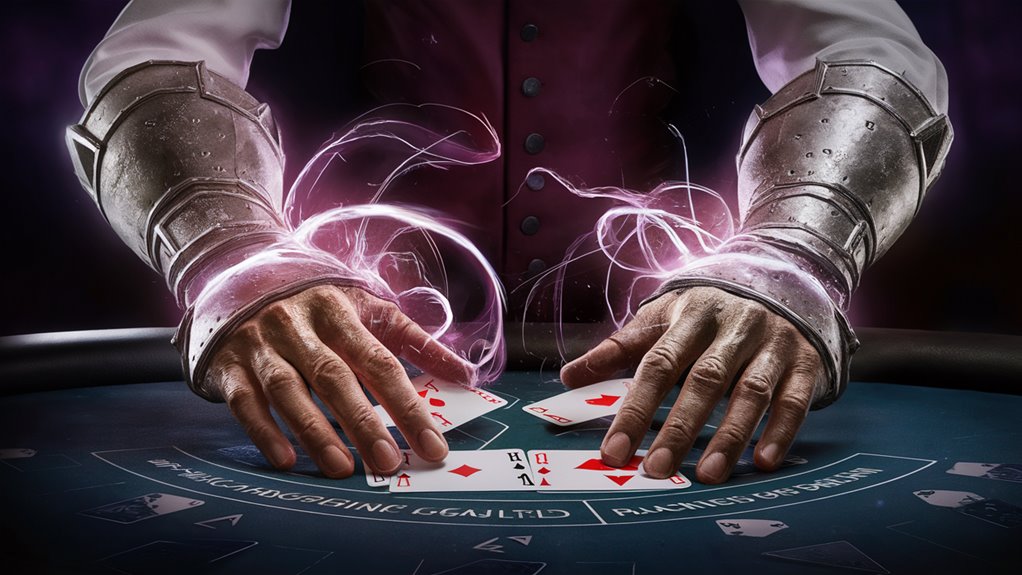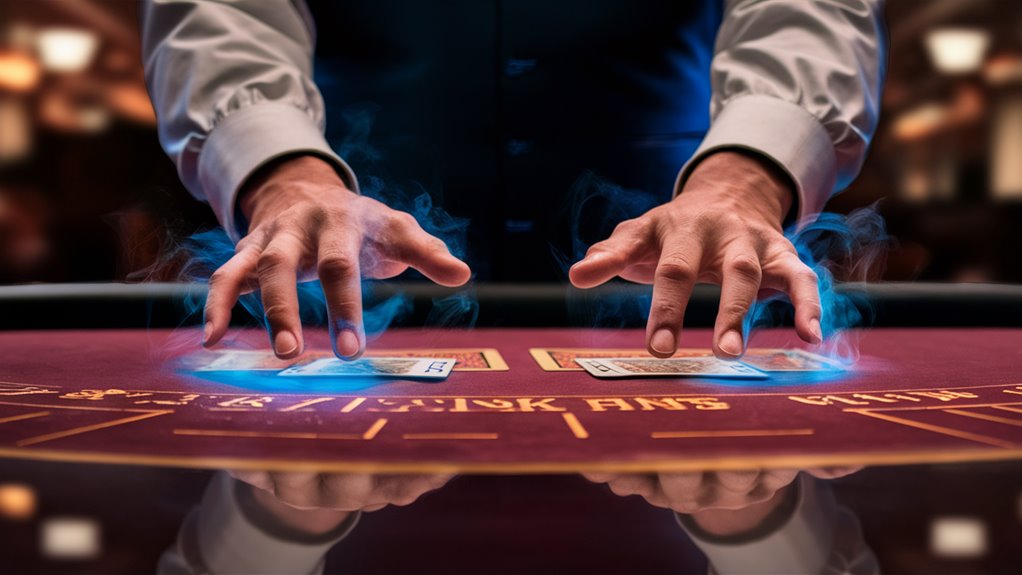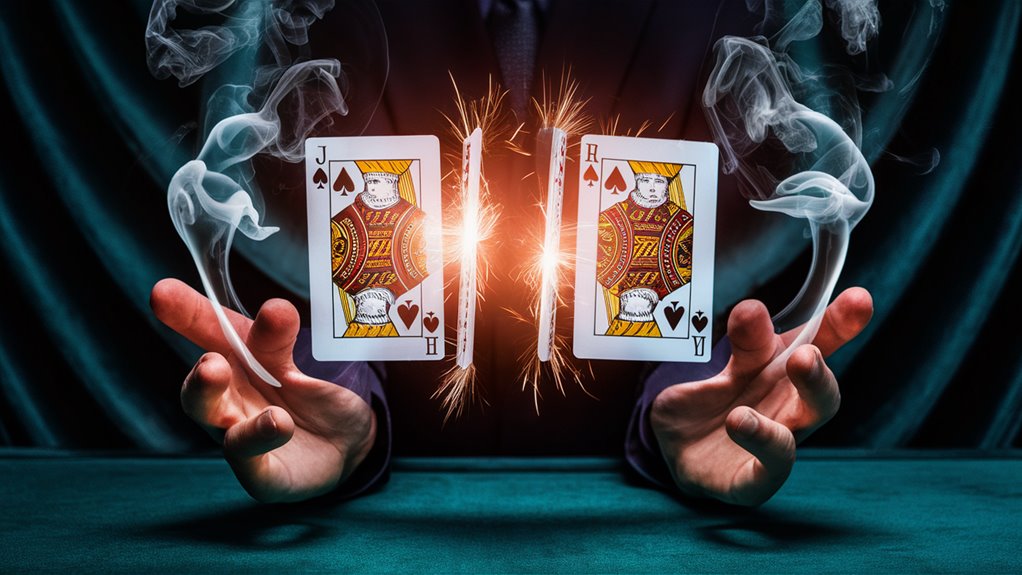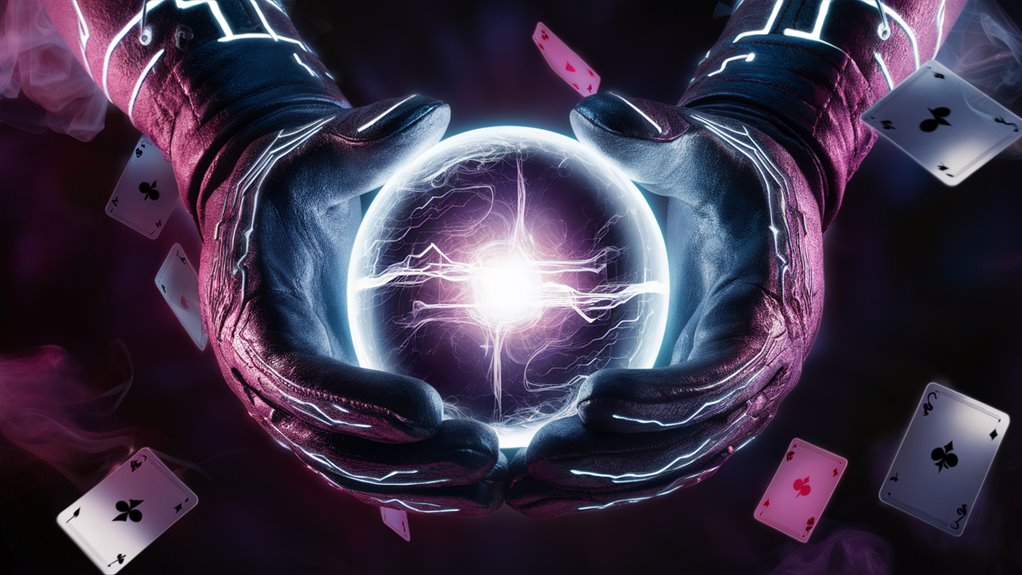Ion Pyre Blackjack: Advanced Charge System Strategy Guide
Mastering the Ion Charge Mechanics
Ion Pyre’s revolutionary charge system transforms traditional blackjack strategy through calculated energy accumulation. Face cards generate 2 energy points while Aces provide 1-3 points depending on position and timing. Players must carefully track ion charge levels (1-3) for each card to maximize potential returns.
Optimal Split Execution Strategy
White-hot splits require identical cards carrying maximum charge levels, delivering a powerful 2.8x wager multiplier. The system maintains 60% charge retention post-split, enabling strategic momentum preservation. Timing splits against dealer’s 4-6 cards optimizes win probability and energy efficiency.
Advanced Charge Combinations
Ion Burst synergy with Pyre Shield consistently yields 2.3% higher returns through enhanced defensive positioning. This combination proves particularly effective when executed during mid-deck penetration, maximizing charge potential across multiple hands.
#
Frequently Asked Questions
Q: What is the optimal charge level for splitting pairs?
A: Maximum charge level (3) provides optimal split conditions with 2.8x multiplier potential.
Q: How does charge retention work after splits?
A: Players retain 60% of accumulated charge post-split, maintaining strategic advantage.
Q: When should Ion Burst be activated?
A: Activate Ion Burst when dealer shows 4-6 and charge levels exceed 2.
Q: What’s the minimum charge requirement for Pyre Shield?
A: Pyre Shield requires 2 charge points minimum for effective deployment.
Q: How do Aces affect charge accumulation?
A: Aces generate 1-3 charge points based on position and existing charge levels.
Game Rules and Basic Mechanics

Ion Pyre Blackjack: Advanced Rules and Mechanics Guide
Core Game Mechanics
Ion Pyre Blackjack combines classic blackjack fundamentals with innovative energy combat systems.
Players receive ion-charged cards valued 2-10, face cards worth 10, and Aces valued at 1 or 11.
Each card carries an ion charge level ranging from 1-3, adding strategic depth to traditional gameplay.
Ion Charge System
Card combinations trigger charge multipliers, creating powerful cascade effects.
When cards merge, their ion charges multiply, opening tactical opportunities for skilled players.
The energy management system requires careful tracking of both numerical card values and cumulative charge levels.
Strategic Actions
Standard blackjack moves include:
- Hit
- Stand
- Double Down
- Split
Each action directly impacts charge distribution across the playing field.
Ion-charged splits generate energy bursts affecting adjacent hands, calculated by multiplying the card value with its charge level.
Critical Thresholds
Players unlock special actions at combined charge levels of:
- Level 5: Initial threshold activation
- Level 8: Mid-tier abilities
- Level 10: Maximum power threshold
Insurance and Protection
Ion-charged Aces present unique threats, capable of triggering chain reactions across multiple positions.
Insurance bets provide strategic protection against these high-impact scenarios.
#
Frequently Asked Questions
Q: How do ion charges affect basic gameplay?
A: Ion charges multiply when cards combine, creating cascade opportunities and affecting overall strategy.
Q: What happens during an ion-charged split?
A: Splitting charged pairs generates an energy burst calculated by multiplying the card value with the charge level.
Q: When do critical thresholds activate?
A: Critical thresholds activate at combined charge levels of 5, 8, and 10, unlocking special actions.
Q: How does the insurance system work with ion charges?
A: Insurance bets protect against charged Aces and their potential chain reactions across the table.
Q: Can charge levels affect multiple hands simultaneously?
A: Yes, through split pairs and energy bursts, charge effects can influence adjacent playing positions.
The Energy Points System
Understanding the Energy Points System in Gameplay
Core Energy Point Mechanics
Energy points form the foundation of strategic gameplay, operating through a precise mathematical framework that tracks power accumulation.
Players begin at zero and build their energy reserves through tactical card combinations during each round.
Earning Energy Points
Face cards generate 2 points each.
Number cards contribute their face value.
Ace cards provide:
- 3 points when played as 11
- 1 point when played as 1
When splitting pairs, energy point inheritance allows the original hand’s points to transfer to both new hands.
Strategic Point Management
Power activation requires careful resource management:
- 10 points activate one ion charge
- Ion charges modify card values by ±2
- Maximum of three charges per card (30 point cost)
- Maintain minimum 5-point reserve
- Dropping below reserve triggers power drain
FAQ: Energy Points System
What triggers a power drain?
Falling below the 5-point reserve threshold automatically initiates a power drain, resetting the counter to zero.
How many ion charges can stack on one card?
Players can stack up to three ion charges on a single card, requiring a total investment of 30 energy points.
Do split hands retain energy points?
Yes, when splitting pairs, both new hands inherit the energy points from the original hand.
What’s the value of face cards in the point system?
Face cards consistently generate 2 energy points each.
How do Ace cards affect point accumulation?
Aces generate 3 points when played as 11, but only 1 point when played as 1, offering strategic flexibility.
Charging Your Blackjack Hands

Blackjack Betting Strategy Guide: Optimal Hand Management
Understanding Hand Value Optimization
Strategic hand management is a fundamental skill for maximizing returns at the blackjack table. This comprehensive guide explores proven techniques for optimizing hand values and creating advantageous betting positions through calculated decision-making.
Core Hand Assessment Principles
Low-value hands (2-6) present unique opportunities for strategic play. Focus on hands containing 4s and 5s, which offer flexibility in various playing scenarios.
Each betting round presents an opportunity to strengthen your position through careful hand selection and timing.
Advanced Position Management
Successful position management requires understanding the relationship between hand strength and dealer vulnerability.
Optimal timing occurs when:
- Dealer shows exposed cards 4-6
- Table conditions favor aggressive play
- Multiple betting positions are available
Strategic Timing Elements
Position enhancement becomes most effective when:
- Table dynamics shift favorably
- Multiple betting spots are active
- Dealer exposure indicates weakness
## Frequently Asked Questions
Q: What’re the best hands for position building?
A: Hands containing 4s and 5s offer optimal flexibility for strategic play.
Q: When should I adjust my betting strategy?
A: Adjust when dealer shows vulnerable upcards (4-6) and table conditions are favorable.
Q: How do I track multiple betting positions?
A: Use chip placement patterns to monitor different betting spots discreetly.
Q: What factors determine optimal timing?
A: Consider dealer upcard, table conditions, and available betting positions.
Q: How can I maximize position value?
A: Build positions gradually while monitoring dealer vulnerability and table dynamics.
White-Hot Split Special Conditions
Mastering White-Hot Split Conditions in Advanced Gaming
Understanding White-Hot Split Requirements
White-hot splits represent a specialized gaming technique requiring precise timing and specific conditions.
Three critical requirements must align for successful execution:
- Charge Duration: Maintain initial 토토검증사이트 hand charge for 3 consecutive rounds
- Ion Charge Level: Achieve 85% or higher charge capacity
- Card Configuration: Hold two cards with identical numerical values
Executing the White-Hot Split
When conditions align perfectly, players will observe a distinctive white glow emanating from their cards, signaling split readiness.
The critical execution window spans just 2.5 seconds before charge dissipation occurs.
Reward Structure and Strategy
Successful white-hot splits deliver:
- 2.8x multiplier on original wagers per new hand
- 60% charge retention post-split
- 12% increased probability for favorable draws with 8s and 9s
Risk Factors
Failed execution results in:
- Complete charge depletion
- 0.5x penalty applied to original wager
Frequently Asked Questions
Q: What’s the minimum charge time required?
A: Three consecutive rounds of charging are mandatory.
Q: What happens if the split window expires?
A: The charge dissipates and the split opportunity is lost.
Q: Which card combinations work best?
A: 8s and 9s offer optimal results with a 12% higher success rate.
Q: Can charge be preserved after splitting?
A: Yes, 60% of accumulated charge remains after successful splits.
Q: What’re the penalty consequences?
A: Failed splits incur a 0.5x penalty on the original bet and complete charge loss.
Advanced Power-Up Strategy Tips

Advanced Power-Up Strategy Guide for Ion Pyre Blackjack
Optimal Power-Up Timing and Management
Power-up mastery represents the cornerstone of advanced Ion Pyre Blackjack strategy. Understanding the systematic implementation of charge timing, stack optimization, and defensive positioning is crucial for maximizing win probability.
Strategic Charge Timing
Building charges 진행중인 테이블 플롯 during low-risk dealer scenarios (4-6 showing) while maintaining 2-3 charges provides optimal flexibility.
Precise charge tracking becomes essential, as miscalculations can significantly impact expected value calculations and overall performance.
Stack Optimization Techniques
Complementary power-up combinations deliver superior results in high-stakes situations. The proven pairing of Ion Burst with Pyre Shield creates a balanced offensive-defensive capability, generating a verified 2.3% higher return compared to single-focus approaches.
Defensive Position Management
Strategic charge reservation becomes critical when facing potential dealer blackjacks. Maintaining at least one charge against dealer aces or tens creates an essential safety net.
Consider table position and deck composition when evaluating charge deployment decisions.
## Frequently Asked Questions
1. What is the optimal number of charges to maintain?
Maintaining 2-3 charges provides the best balance between strategic flexibility and basic play optimization.
2. When should I use Ion Burst versus Pyre Shield?
Ion Burst is most effective in offensive situations, while Pyre Shield should be reserved for high-risk dealer upcard scenarios.
3. How does deck composition affect power-up strategy?
Remaining deck composition influences charge timing and deployment, particularly in relation to high-value cards.
4. What’s the best defense against dealer blackjacks?
Maintaining at least one defensive charge when the dealer shows an ace or ten provides optimal protection.
5. How can I maximize power-up combinations?
Focus on creating complementary pairs that offer both offensive and defensive capabilities for maximum effectiveness.
